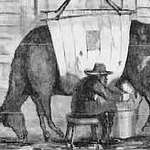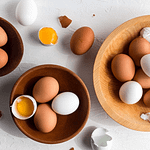Cookbooks provide context into a specific cuisine; allow readers to emulate royal diets; provide meaningful instruction in how to nourish and nurture others with food; or even just whet the imagination and the appetite. This latest installment of As We Eat’s Kitchen Technology series turns our attention to the cookbook - a powerhouse culinary tool that instructs, educates, and inspires.

A glimpse of you through your cookbook collection
What does your favorite cookbook say about you? For centuries, cookbooks have not only instructed us on how to prepare a dish, but also educated, entertained, and inspired our food preferences and choices. Join us as we reflect on some of our favorites and muse about how the cookbook of the future may look.
Cookbooks: Time travel, insights, and touch points
Cookbooks form a critical backbone in how we conceptualize and communicate how a dish tastes through its headnotes, the ingredients of which it is composed (ingredient list), and the means by which to make it (technique).
For As We Eat’s latest addition to our celebrated Kitchen Technology series, Leigh and Kim delve into the history of cookbooks - the oldest dating to the First Century! - with an eye towards how cookbooks instructed and informed its readers about the diets of royalty and the foods that were both delicious and healthy. These recipes often reflect the abundance and variety of ingredients available to the wealthy.
As food scarcity decreased and variety became more accessible to all classes, cookbooks shifted focus towards the needs of the common man. Technological and cultural innovations that benefitted literacy and made home kitchens more capable of producing larger, regular meals was reflected in the variety of cookbooks published by acclaimed chefs, food pioneers, and food companies. Our grocery stores and pantries filled with both fresh and canned foods that changed the fundamental question from what to cook but how to make the most of our abundance.
Kim shared how four keystone books in her personal cookbook collection serve as historical touch points to vintage recipes and special family memories, and we conclude with speculation about how today’s technology will influence how future generations might create, share, and use cookbooks and recipes.

Take a look at your cookbook collection. Does it speak to culture, cuisine, memories or something entirely different?
Episode Transcript
🎧 Click here for the full, interactive transcript of this episode 🎧
Sources We Found Helpful for this Episode
Books We Think You’ll Enjoy Reading
Mastering the Art of French Cooking, two-volume set
Betty Crocker’s Cookbook, 1974 Ring-Bound
Episodes We Think You’ll Like
EP 36 Feminism at the Kitchen Counter: From Betty Crocker to Julia Child
EP 37 From the Kitchen to the Voting Booth: Suffrage for Women and Community Cookbooks
Join us in two weeks for another listener requested journey as we share history, lore and musings about the sweet preservation of fruits and berries.
If you’re enjoying the podcast…
we would love it if you would consider becoming a supporting subscriber. For just a few dollars, you can get access to exclusive content including our Recipe Box Roulette “card” game, more in-depth articles, more recipes and you’ll help keep our oven lights on!
We would love to connect with you
AsWeEat.com, on Instagram @asweeat, join our new As We Eat community on Facebook, or subscribe to the As We Eat Journal.
Do you have a great idea 💡 for a show topic, a recipe 🥘 that you want to share, or just say “hi”👋🏻? Send us an email at connect@asweeat.com
Review As We Eat on Podchaser or Apple Podcast. We would like to know what you think.
Thank you for listening to the As We Eat Podcast. This post is public so share it with a friend - or three :)
























Share this post